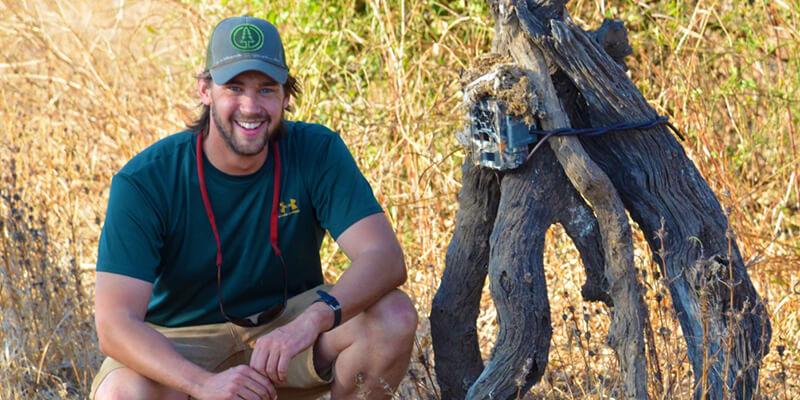The Rubenstein School is pleased to announce this year’s recipients of its RSENR graduate scholarship and fellowship awards.
“We are very thankful to our donors for making these generous scholarships and fellowships available to Rubenstein School graduate students,” said Kimberly Wallin, interim associate dean for research and graduate programs. “These valuable awards support graduate students to successfully undertake and complete their research and scholarship goals.”
Steven Rubenstein Graduate Fellowship
Incoming Ph.D. student Elias Rosenblatt (ENSC, WFB ’10) has received a three-year research graduate research assistantship through a Steven Rubenstein Graduate Fellowship. The fellowship is one component of a large gift made to the Rubenstein School by Steven (UVM ’61) and Beverly Rubenstein in 2003.
Elias is advised by Associate Professors Jed Murdoch and Terri Donovan. For his dissertation research, beginning fall 2016, Elias will develop an Ecosystem Scorecard for the Northern Forest using hunter-harvested wildlife as indicators of change in ecosystem health and services. The Ecosystem Scorecard and related analytical tools will aid natural resource managers in better managing wildlife populations in the face of climate change and forest land conversion in the region.
Elias earned a dual B.S. degree in environmental sciences and in wildlife and fisheries biology from the Rubenstein School. He is completing his M.S. degree in wildlife and fisheries management at Montana State University, where he conducts research as an ecology staff member with the Zambian Carnivore Programme. In Zambia, he studies the status and future of several large carnivore populations facing increasing human encroachment. In particular, for his master’s work, he is assessing the impacts of illegal bushmeat poaching and legal trophy hunting on key African lion and leopard populations in South Luangwa National Park.
Heiser Graduate Award
First year M.S. students Margaux Reckard and Finn Yarbrough have each received a Heiser Educational Graduate Award made available through the generosity of Arthur J. and Claire Heiser in honor of Florence Tinker Matteossian.
Margaux Reckard is advised by Professor Patricia Stokowski. Margaux’s master’s research focuses on the language used in how Vermont ski areas and proximal communities market Vermont’s natural resources and attractions to Vermont visitors. Her goal is to understand how and to what extent ski areas socially construct space, place, and nature through mass media.
Margaux earned her B.A. degree in anthropology and sociology from Kalamazoo College in Michigan. She has worked as a paralegal at a law firm, interned at a land trust organization, and served as an outdoor education instructor and wilderness expedition leader.
Finn Yarbrough is advised by Professor Adrian Ivakhiv and is a professional filmmaker. For his master’s research, Finn will produce the pilot for a regional documentary series on food sovereignty aimed at children and families of the Lake Champlain Basin. His goal with the series is to tap into existing social capital, developing a cohesive cultural narrative that reconnects people to the production, preparation, and consumption of their food at home.
Finn earned his B.A. in literary arts from Brown University. He has produced several documentaries on such topics as Islamic/animistic plurality in Mali, the spirituality of wind energy development in Vermont, human-canid co-evolution, and the cumulative power of a silent century.
Chrysalis Graduate Award
Current Ph.D. students Brian O’Malley, Matthew Vaughan, and Xiao Xiao have each received a Chrysalis Graduate Award made possible by a gift from F. Peter Rose (UVM ’54), a longtime member of the Rubenstein School Board of Advisors, who established the Chrysalis Graduate Fund in 2007.
Brian O’Malley is advised by Associate Professor Jason Stockwell. For his doctoral research, Brian is studying the daily vertical migration patterns of a shrimp-like macro-invertebrate (Mysis diluviana) in Lake Champlain. His goal is to fill in key knowledge gaps regarding the resource use, distribution, and behavior of this important food web constituent in deep lakes to benefit researchers and natural resource managers concerned with food web management.
Brian earned his B.S. in environmental biology from SUNY College of Environmental Science and Forestry, where he worked as a research aide and analyst. He has worked as a research technician at the Great Lakes Science Center in Ann Arbor, Michigan, and the Cornell University Biological Field Station in Bridgeport, New York.
Matthew Vaughan is advised by Professor Breck Bowden in the Rubenstein School and Assistant Professor Andrew Schroth in the Geology Department. For his dissertation research, Matt is maintaining a network of eight sensors in four Vermont streams to monitor dissolved organic carbon, nitrate, and total phosphorus. Matt targeted streams located in watersheds associated with various land uses so he can determine how land use influences water quality.
Before turning his attention to watershed hydrology, water quality, and biogeochemical cycling, Matt studied renewable energy, hydrogen fuel production, and astrophysics. He earned his M.S. in hydrologic sciences from the University of California, Davis and his B.A. in physics from Middlebury College.
Xiao completed her undergraduate degree in tourism management and her Master's degree in human geography at Nanjing University in China. Her Master's thesis focused on the formative mechanism and spatial differences of visitors' sense of place in Jiuzhai Valley National Park, China.
